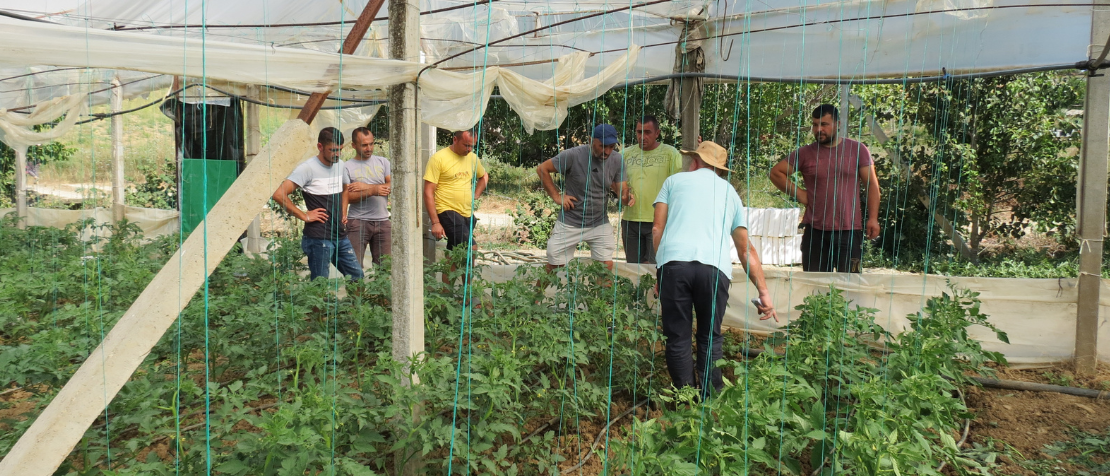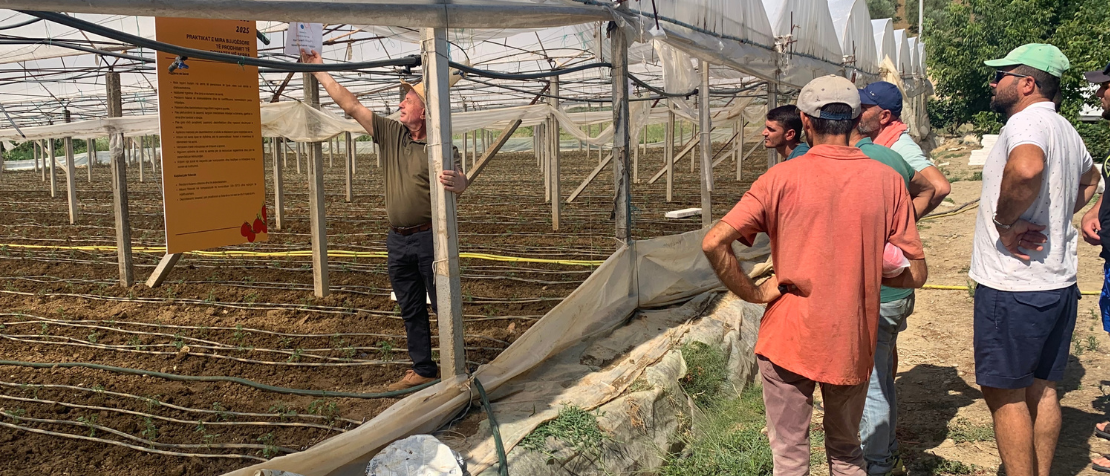Empowering greenhouse farmers in Albania: FAO launches Farmer Field Schools

©FAO
A ten-day Farmer Field Schools session starts today in Albania, equipping smallholders with practical and state-of-the-art knowledge on greenhouse production. The training is part of a series launched on 1 July by the Food and Agriculture Organization of the United Nations (FAO) to support sustainable agriculture and empower smallholder farmers through the Business, Partnerships & Solutions for Sustainable Development Goals (B4SDG II) project, implemented with support from the Government of Sweden.
“This programme reflects FAO’s continued commitment to working hand in hand with farmers and local institutions to strengthen sustainable, inclusive and climate-resilient food systems in Albania,” said Lorena Pullumbi, Assistant FAO Representative in Albania.
Following the successful kick-off session in July and several training modules held since then in Kurtinë Village, the training series continues this week with the highly important topic of water quality and irrigation. Bringing together greenhouse growers, field agronomists and agribusiness professionals, the ten-day module is aimed at deepening knowledge and understanding regarding irrigation water properties, analysis techniques, crop water needs, tensiometers and irrigation scheduling. In Karbunarë, as part of the same training, agricultural experts and farmers will gain new skills related to planting materials, particularly about seedling production quality, grafting strategies, cucumber crop focus, rootstock/scion optimization and growth/yield management.
“We aim to support Albanian farmers to adopt good agricultural practices, improve productivity and reduce costs while building resilience to climate challenges,” said Sara Businaro, FAO Project Coordinator and Sustainable Agriculture Specialist. “Through these field schools, we are offering practical, locally adapted knowledge that farmers can apply directly in their greenhouses.”
Through the end of the year, 14 full-day training sessions are planned on two demonstration farms in Kurtinë/Hysgjokaj and Karbunarë, in the Lushnja region, targeting both simple and improved greenhouse systems. Led by seasoned trainers, the curriculum will cover such key areas as microclimate management, pest and disease control, efficient irrigation and water quality, plant nutrition and fertigation, high-quality seedling selection and grafting, agribusiness models and financing opportunities.
Each session concludes with a farmer-to-farmer reflection circle and a space for dialogue, peer learning and feedback, held in nearby local venues over refreshments.
“These trainings not only strengthen technical skills but also help build stronger ties between institutions and the farming community,” said Agim Qose, Director of the Department for Agricultural and Rural Development in the Municipality of Lushnja. “It’s a big step forward for Lushnja’s agricultural future.”
By the end of 2025, the training is expected to reach many greenhouse growers from the Lushnja region, equipping them with practical tools and knowledge to increase yields, improve quality and reduce environmental impacts. The experience also will serve as a springboard for expanding the training model to other value chains, with a specific focus on olive and olive oil production in 2026.
The B4SDG II initiative in Albania is an integral part of FAO’s efforts to support inclusive rural transformation and climate-resilient agriculture while also contributing to the achievement of the Sustainable Development Goals through farmer-led learning and innovation.

©FAO
Contact
Sara BusinaroFAO Project Coordinator and Sustainable Agriculture Specialist
FAO Albania
[email protected]
